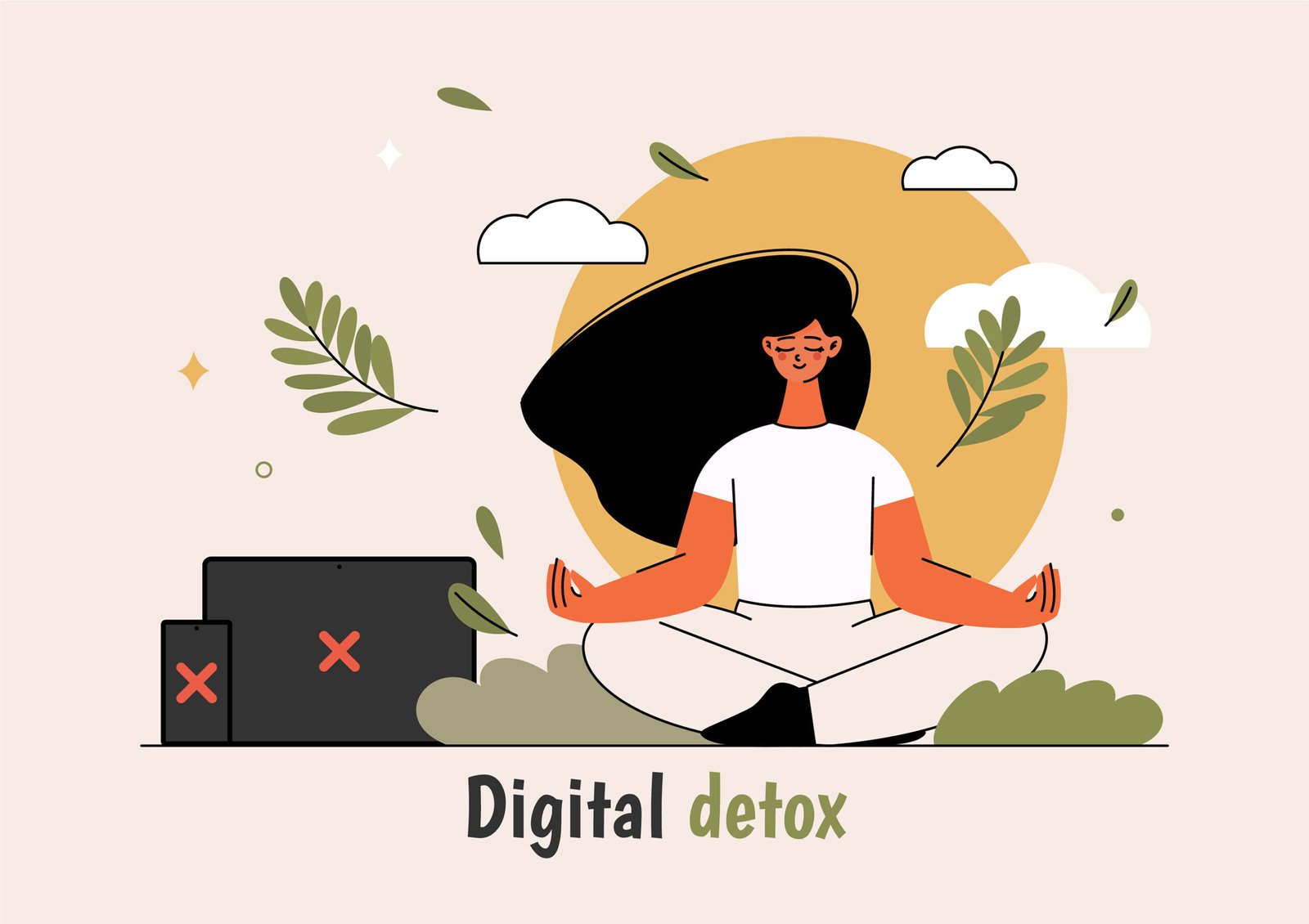Now Reading: 4 Dopamine Detox: What It Is and How It Can Reset Your Brain
-
01
4 Dopamine Detox: What It Is and How It Can Reset Your Brain
4 Dopamine Detox: What It Is and How It Can Reset Your Brain

Feeling Overstimulated and Unfocused?
Have you ever felt like you just can’t stop checking your phone, binge-watching shows, or craving sugary snacks even when you don’t want to? I’ve been there too—and like most people, I didn’t realize how much of it was tied to something called dopamine.
After learning about the concept of dopamine detox, I decided to give it a try. The results were surprising. I gained more clarity, better control over my habits, and a deeper sense of peace.
In this blog post, I’ll break down what dopamine detox is, how it works, and how you can reset your brain to regain focus, motivation, and emotional stability—naturally and effectively.
What Is Dopamine?
Dopamine is a neurotransmitter—a chemical messenger in the brain that plays a key role in how we experience pleasure, motivation, and reward. Every time you scroll social media, eat junk food, or complete a task, your brain releases a bit of dopamine as a reward.
While dopamine is essential for survival, modern life overstimulates our dopamine system. From fast food to digital entertainment, we’re bombarded with instant gratification. This constant stimulation can desensitize your brain’s reward system, making it harder to feel joy, stay focused, or delay gratification.
What Is a Dopamine Detox?
A dopamine detox (also called “dopamine fasting”) is a period where you intentionally avoid activities that provide instant gratification. The goal isn’t to eliminate dopamine (you can’t), but to reduce overstimulation and reset your brain’s sensitivity to pleasure.
Common dopamine triggers:
- Social media
- Video games
- Junk food
- Streaming platforms
- Online shopping
- Pornography
- Constant multitasking
A dopamine detox involves temporarily avoiding these triggers to:
- Reset your brain’s reward system
- Increase focus and motivation
- Rebuild self-discipline
- Feel pleasure from simple things again
How Dopamine Detox Resets the Brain
1. Rewires Habit Loops
The brain forms habits through reward-based learning. Dopamine plays a major role in reinforcing those habits. By avoiding triggers, you weaken unhealthy loops and strengthen your ability to make conscious choices.
2. Improves Focus
Constant switching between dopamine hits (checking notifications, snacking, etc.) causes attention fragmentation. A detox allows your mind to settle, leading to deeper focus.
3. Boosts Motivation
Too much dopamine release from artificial sources can reduce motivation for everyday goals. A detox helps reset your natural dopamine baseline, so you feel motivated by real progress, not distractions.
Signs You May Need a Dopamine Detox
- You feel constantly distracted or bored
- You can’t go 10 minutes without checking your phone
- You’ve lost interest in activities you once enjoyed
- You rely on external rewards to feel good
- You procrastinate even on simple tasks
- You feel mentally exhausted or emotionally numb

How to Do a Dopamine Detox: Step-by-Step Guide
Step 1: Identify Your Triggers
Start by listing all the things you do compulsively for short-term pleasure. These are your dopamine triggers. Examples include:
- Scrolling Instagram
- YouTube bingeing
- Ordering food online
- Mindless texting
Step 2: Choose a Detox Duration
You don’t have to go cold turkey for a week. Start small:
- 2–4 hours: Great for beginners
- 1 day: Helps you gain clarity
- Weekend detox: Creates deeper impact
- 7-day reset: For serious change
Step 3: Replace With Low-Dopamine Activities
Instead of giving up everything, replace your high-stimulation habits with intentional, calming activities:
- Journaling
- Walking in nature
- Reading books
- Meditating
- Practicing yoga or deep breathing
- Cleaning or organizing
Step 4: Reflect on the Experience
After your detox:
- What did you notice?
- Did your cravings reduce?
- Were you more focused?
- Did you feel calmer or more present?
Journaling your observations helps reinforce the benefits and build self-awareness.
My Personal Experience With Dopamine Detox
I remember trying my first dopamine detox on a Sunday. I turned off my phone, skipped social media, avoided sweets, and spent the day reading, writing in my journal, and walking around a nearby park.
At first, I was restless and kept reaching for my phone instinctively. But by the afternoon, a calm wave settled in. I had no pressure to “perform” or stay connected. I began to appreciate the birdsong, the cool breeze, and even my thoughts.
The next day, I felt mentally refreshed, more in control of my routine, and surprisingly creative. That one-day detox sparked a weekly habit that still helps me stay balanced in a chaotic digital world.
Common Mi sconceptions About Dopamine Detox
❌ Myth 1: You’re Eliminating Dopamine
No, dopamine is essential. You’re not eliminating it—you’re reducing overstimulation to balance your levels.
❌ Myth 2: It’s Just About Phones
While digital detox is part of it, dopamine detox includes all instant gratification habits—including food, entertainment, and even gossip.
❌ Myth 3: You Have to Live Like a Monk
A dopamine detox doesn’t mean you must meditate for hours in silence. Even small breaks from overstimulation can bring results.
Tips to Make Your Dopamine Detox More Effective
- Use airplane mode or a lock box for your phone
- Create a calming environment (candles, quiet music, tidy room)
- Schedule mindfulness sessions (deep breathing or meditation)
- Write down your goals to stay intentional
- Stay hydrated and nourished (avoid energy crashes)
- Set realistic expectations—you might feel bored at first, and that’s okay!
Long-Term Benefits of Regular Dopamine Detox
- Improved self-control
- Better attention span
- Lower anxiety and stress
- Increased motivation
- Enhanced creativity
- Greater emotional resilience
- More enjoyment in life’s simple pleasures
How Often Should You Do a Dopamine Detox?
There’s no one-size-fits-all answer. Some people benefit from:
- Daily micro-detox: 1–2 hours without stimulation
- Weekly detox: 1 full day of intentional rest
- Monthly deep reset: A weekend away from all digital and processed triggers
- Find what works best for your lifestyle and mental needs.
Your Brain Deserves a Break
We live in a world that constantly competes for our attention. And while dopamine isn’t the villain—it’s our relationship with it that matters.
A dopamine detox is more than just a trend. It’s a powerful self-care practice that helps you reclaim your mind, refocus your energy, and feel truly present. Whether you try it for a few hours or an entire weekend, the impact can be surprisingly transformative.
You owe it to yourself to reset. Your brain—and your peace—deserve it.
Frequently Asked Questions (FAQs)
Q1: Is dopamine detox scientifically proven?
A: While the term “dopamine detox” isn’t clinical, the concept of reducing overstimulation is supported by neuroscience and psychology.
Q2: Can dopamine detox cure addiction or depression?
A: It’s not a medical cure, but it can complement therapy and help manage compulsive behaviors.
Q3: Do I have to cut out everything fun?
A: No. The idea is to reduce unhealthy, compulsive pleasures and rebuild balance—not remove all joy.












